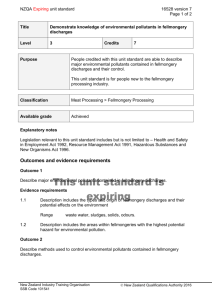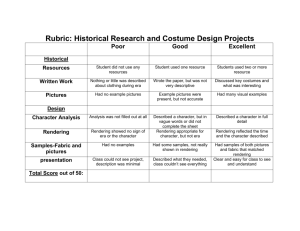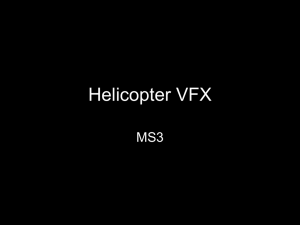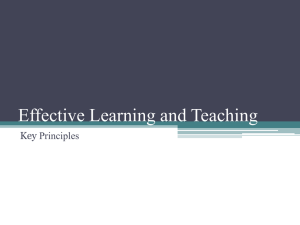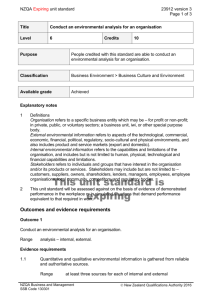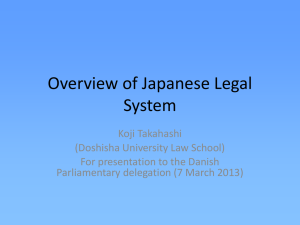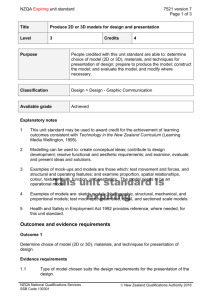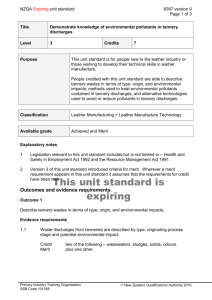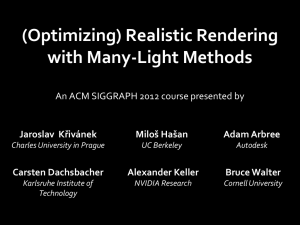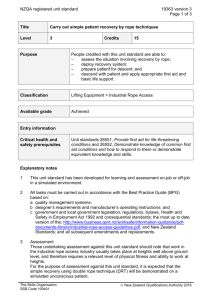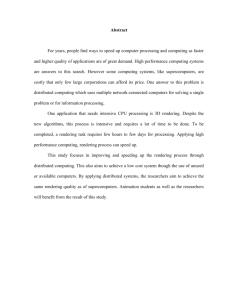27264 Demonstrate knowledge of environmental controls
advertisement
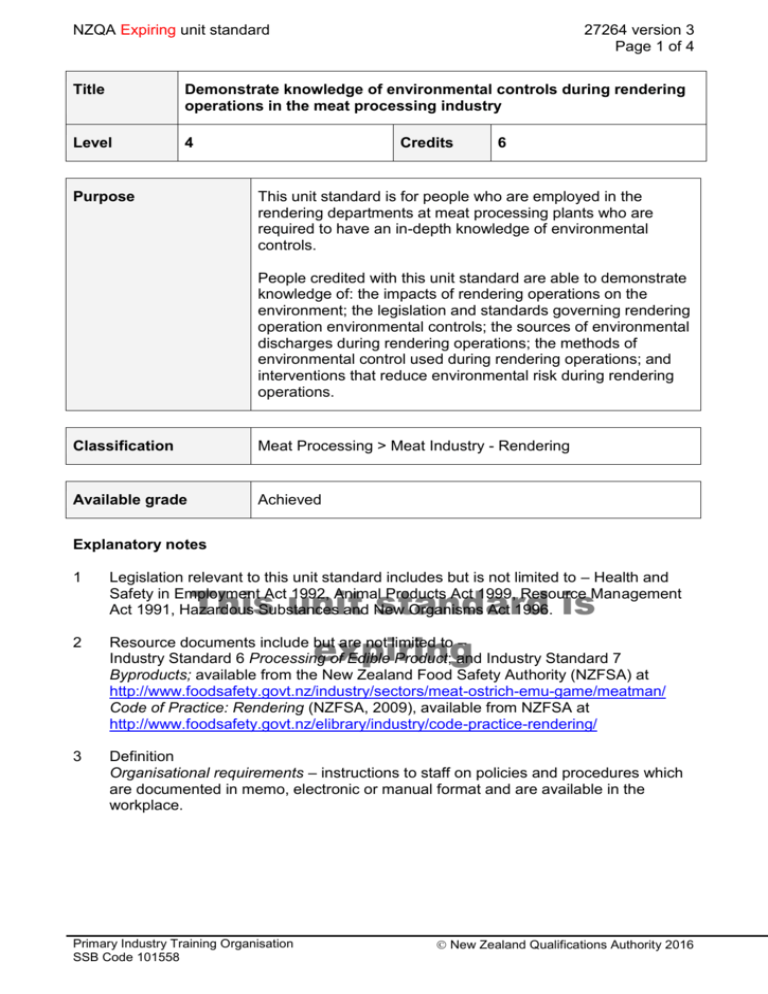
NZQA Expiring unit standard 27264 version 3 Page 1 of 4 Title Demonstrate knowledge of environmental controls during rendering operations in the meat processing industry Level 4 Purpose Credits 6 This unit standard is for people who are employed in the rendering departments at meat processing plants who are required to have an in-depth knowledge of environmental controls. People credited with this unit standard are able to demonstrate knowledge of: the impacts of rendering operations on the environment; the legislation and standards governing rendering operation environmental controls; the sources of environmental discharges during rendering operations; the methods of environmental control used during rendering operations; and interventions that reduce environmental risk during rendering operations. Classification Meat Processing > Meat Industry - Rendering Available grade Achieved Explanatory notes 1 2 Legislation relevant to this unit standard includes but is not limited to – Health and Safety in Employment Act 1992, Animal Products Act 1999, Resource Management Act 1991, Hazardous Substances and New Organisms Act 1996. This unit standard is Resource documents include but are not limited to – expiring Industry Standard 6 Processing of Edible Product; and Industry Standard 7 Byproducts; available from the New Zealand Food Safety Authority (NZFSA) at http://www.foodsafety.govt.nz/industry/sectors/meat-ostrich-emu-game/meatman/ Code of Practice: Rendering (NZFSA, 2009), available from NZFSA at http://www.foodsafety.govt.nz/elibrary/industry/code-practice-rendering/ 3 Definition Organisational requirements – instructions to staff on policies and procedures which are documented in memo, electronic or manual format and are available in the workplace. Primary Industry Training Organisation SSB Code 101558 New Zealand Qualifications Authority 2016 NZQA Expiring unit standard 27264 version 3 Page 2 of 4 Outcomes and evidence requirements Outcome 1 Demonstrate knowledge of the impacts of rendering operations on the environment. Evidence requirements 1.1 Impacts of rendering operations on the environment are explained in terms of odour, waste water and noise. Outcome 2 Demonstrate knowledge of the legislation and standards governing rendering operation environmental controls. Range legislation includes but is not limited to – Animal Products Act 1999, Health and Safety in Employment Act 1992, Resource Management Act 1991, Hazardous Substances and New Organisms Act 1996. Evidence requirements 2.1 Legislation and standards governing environmental controls are described in terms of their application to processing rendered products. 2.2 Penalties for non-compliance with legislation are outlined in terms of cost to the company. Outcome 3 Demonstrate knowledge of the sources of environmental discharges during rendering operations. This unit standard is Sources of environmental discharges are outlined in terms of rendering expiring processes. Evidence requirements 3.1 Range 3.2 sources may include but are not limited to – storage of raw material, size reduction, cooking, drying, separation, pressing, grinding, screening, end product storage. Types of environmental discharges are described in terms of rendering processes. Range discharges may include but are not limited to – odours, particulates, noise. Primary Industry Training Organisation SSB Code 101558 New Zealand Qualifications Authority 2016 NZQA Expiring unit standard 27264 version 3 Page 3 of 4 Outcome 4 Demonstrate knowledge of the methods of environmental control used during rendering operations. Evidence requirements 4.1 Environmental controls for odour emissions are described in terms of methods and cost effectiveness. Range 4.2 Rendering wastewater contaminants are described in terms of key components and source. Range 4.3 contaminants may include but are not limited to – suspended solids, biochemical or chemical oxygen demand, nitrogen. Environmental controls for wastewater emissions are outlined in terms of methods and cost effectiveness. Range 4.4 methods include but are not limited to – prevention, biofiltration, wet chemical scrubbing, thermal oxidation, activated carbon, dispersion. methods may include but are not limited to – dissolved air flotation, chemical dosing, activated sludge, direct capture. Environmental control methods for odour, wastewater and noise are outlined in terms of monitoring, sampling and testing in accordance with organisational and statutory requirements. Outcome 5 This unit standard is Evidence requirements expiring Demonstrate knowledge of interventions that reduce environmental risk during rendering operations. 5.1 Interventions to reduce environmental risk are outlined in terms of efficient use of water and steam. Range interventions include but are not limited to – water recycling, equipment design, screens. This unit standard is expiring. Assessment against the standard must take place by the last date for assessment set out below. Primary Industry Training Organisation SSB Code 101558 New Zealand Qualifications Authority 2016 NZQA Expiring unit standard 27264 version 3 Page 4 of 4 Status information and last date for assessment for superseded versions Process Version Date Last Date for Assessment Registration 1 17 June 2011 31 December 2016 Review 2 27 January 2015 31 December 2016 Rollover 3 17 September 2015 31 December 2018 Consent and Moderation Requirements (CMR) reference 0033 This CMR can be accessed at http://www.nzqa.govt.nz/framework/search/index.do. Please note Providers must be granted consent to assess against standards (accredited) by NZQA, before they can report credits from assessment against unit standards or deliver courses of study leading to that assessment. Industry Training Organisations must be granted consent to assess against standards by NZQA before they can register credits from assessment against unit standards. Providers and Industry Training Organisations, which have been granted consent and which are assessing against unit standards must engage with the moderation system that applies to those standards. Requirements for consent to assess and an outline of the moderation system that applies to this standard are outlined in the Consent and Moderation Requirements (CMR). The CMR also includes useful information about special requirements for organisations wishing to develop education and training programmes, such as minimum qualifications for tutors and assessors, and special resource requirements. This unit standard is expiring Primary Industry Training Organisation SSB Code 101558 New Zealand Qualifications Authority 2016
